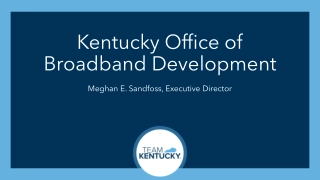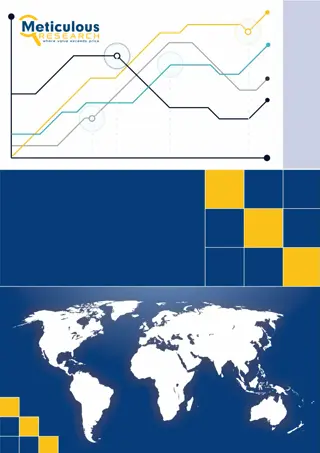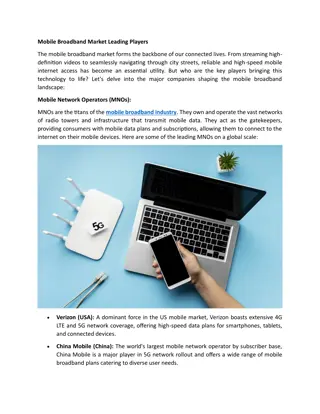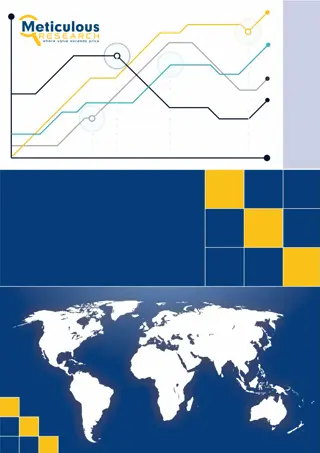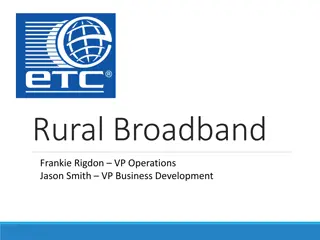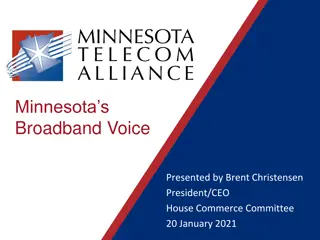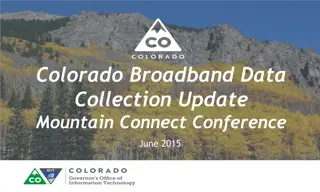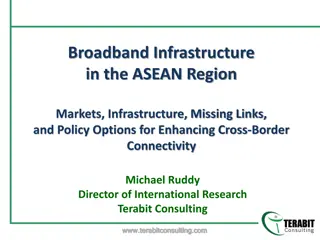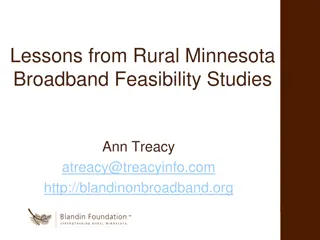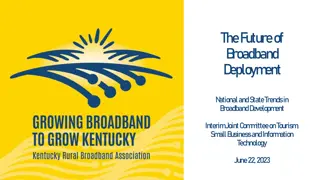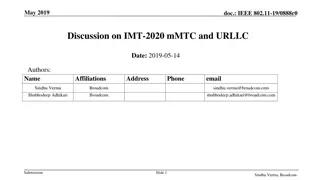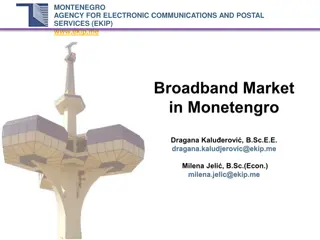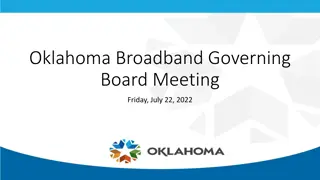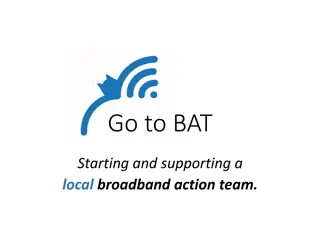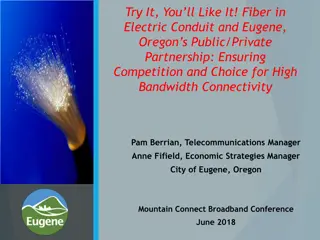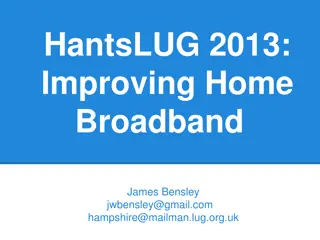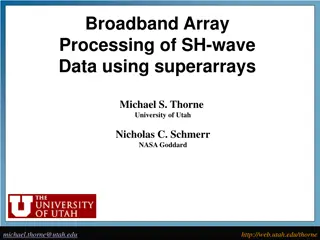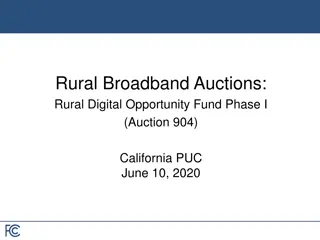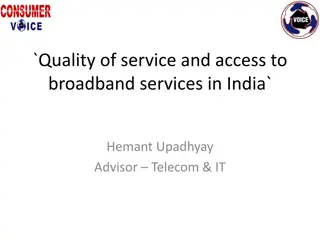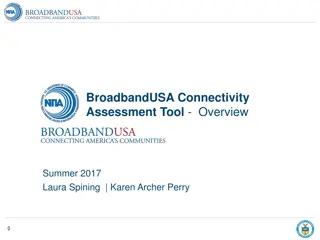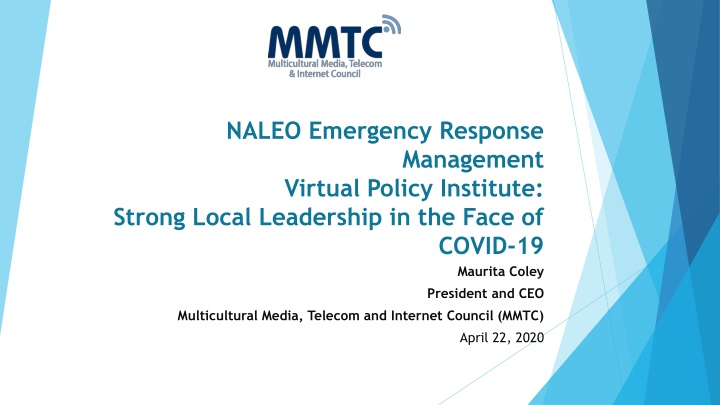
Strong Local Leadership in the Face of COVID-19 Impact on Communities
Explore the impact of COVID-19 on communities, focusing on the crucial role of local leadership in addressing issues related to communications, access to broadband, healthcare, education, and workforce challenges. Learn how organizations like MMTC are advocating for equal opportunities and civil rights in media, telecom, and tech industries to bridge the digital gap and empower minority communities during these challenging times.
Download Presentation

Please find below an Image/Link to download the presentation.
The content on the website is provided AS IS for your information and personal use only. It may not be sold, licensed, or shared on other websites without obtaining consent from the author. If you encounter any issues during the download, it is possible that the publisher has removed the file from their server.
You are allowed to download the files provided on this website for personal or commercial use, subject to the condition that they are used lawfully. All files are the property of their respective owners.
The content on the website is provided AS IS for your information and personal use only. It may not be sold, licensed, or shared on other websites without obtaining consent from the author.
E N D
Presentation Transcript
NALEO Emergency Response Management Virtual Policy Institute: Strong Local Leadership in the Face of COVID-19 Maurita Coley President and CEO Multicultural Media, Telecom and Internet Council (MMTC) April 22, 2020
About MMTC: The Multicultural Media, Telecom and Internet Council (MMTC) is a national nonprofit organization dedicated to promoting and preserving equal opportunity and civil rights in the mass media, telecommunications and broadband industries, and closing the digital divide. MMTC is generally recognized as the nation s leading advocate for minority advancement in communications. Three Core Service Areas: 1. Tech, Media, and Civil Rights Law and Policy Advocacy. Bring about and influence change in media, telecom, and tech diversity policy at the FCC and on the Hill Build a pipeline of next-generation law and policy professionals through education, outreach, training, fellowships, internships, and mentorships 2. Entrepreneurship and Economic Empowerment. Provide opportunities for and promote diverse media, telecom, and tech ownership, and diversity in the supply chain 3. Upskilling Tomorrow s Workforce. Modernize the Earn While You Learn model such as registered apprenticeship and other ways to upskill and prepare underrepresented communities for high-demand jobs
COVID-19: Communications, Access, and Impact on Our Communities Access to affordable broadband is critical as millions of Americans are quarantined at home. Jobs: 22 million are unemployed - unemployment rate is at its highest since Great Depression. 3 out of 5 Americans work for hourly wages. Service sector and similar jobs are among the hardest hit and communities of color over- index in these positions. Healthcare: Communities of color have higher rates of health problems, such as high blood pressure and diabetes, that increase risk of serious complications and death from COVID-19. Many healthcare providers are providing telemedicine services, but millions of people lack the tools to access them. Many urban and rural healthcare providers don t have access to the broadband connections needed to provide telemedicine services. An affordable connection is vital as people apply for jobs, healthcare, classes to retrain in new fields, and keep in touch with loved ones.
COVID-19, Communications, Access, and Impact on Our Communities Access to affordable broadband is critical as millions of Americans are quarantined at home. Education: More than 55 million children are home as a result of COVID-19. Schools are transitioning to online learning: Traffic on educational apps is now up 167% Number of people using collaboration tools is up 137% - that s more than double! An estimated 18 million school-age children don't have internet at home. Families that do have internet must make decisions such as whether to prioritize access for their high school senior or first grader learning to read. Some areas are offering wi-fi hotspots in parking lots, and many are still setting them up. Families must weigh risks of placing kids as sitting ducks in parking lots with expensive devices. With many classrooms moving entirely online, the lack of internet access can have a major impact on a student's ability to learn.
Government and Industry Efforts: FCC s Keep Americans Connected Pledge FCC Chairman Ajit Pai asked broadband and phone service providers to take a pledge to Keep Americans Connected to ensure they don t lose connectivity. More than 700 companies and associations have signed the Chairman's pledge. Chairman Pai has also urged companies with low-income broadband programs to expand and improve them and those without them to adopt such programs. He called on broadband providers to relax their data usage limits in appropriate circumstances and take steps to promote remote learning and telehealth. List of companies available here - https://www.fcc.gov/keep-americans-connected
Examples of Companies Initiatives During COVID-19 Major companies are going beyond the Keeping Americans Connected Pledge: AT&T: Providing all wireline and wireless home internet customers with unlimited internet data, offering free data plans for certain school-issued tablets for 60 days. Charter: Offering up to 100 Mbps broadband service for free for 60 days to new households with K-12 and/or college students, waiving installation fees for such households, and providing connectivity upgrades to over two dozen healthcare facilities across the country. Comcast: Increasing broadband speeds for internet Essentials low-income customers from 15 Mbps to 25 Mbps, offering broadband service for free for 60 days to new internet Essentials customers, and offering all customers unlimited data for 60 days. T-Mobile and Sprint: Helped establish connectivity solutions for over 500,000 students across more than 820 schools. Helping with 1Million Project already connected 350,000 high school students with free home internet connectivity. Univision: Expanded coverage and aired over 190 hours of news programming, an increase of 30 hours. Focused Sunday night primetime newsmagazine to telling stories of Hispanics impacted by COVID-19. Launched Juntos en Casa (Together at Home) to provide information and promote staying at home. Verizon: Voluntarily extending the FCC Pledge until June 30th. Automatically adding 15GB of data for wireless consumers and small businesses. Under the pledge, VZ will neither terminate service nor charge late fees for residential and small business (50 lines or less) customers. More details about additional companies: https://www.fcc.gov/companies-pledging-keep-americans-connected- during-pandemic-go-above-and-beyond-call
Government and Industry Efforts: FCC s Telehealth Program On April 2, the FCC established a $200 million COVID-19 Telehealth Program. Goal: To help healthcare providers including hospitals, urgent care centers, and doctors offices - provide connected care services to patients at their homes or mobile locations in response to the pandemic. The Program will provide immediate support to eligible healthcare providers responding to the pandemic by fully funding their telecommunications services, information services, and devices necessary to provide critical connected care services. Congress appropriated the funds as part of the CARES Act. To learn more about eligibility and to submit an application, visit fcc.gov/covid19telehealth.
Government and Industry Efforts: Workforce Initiatives in Telecom Department of Labor Employment and Training Administration (ETA) offers federal grants to states for public employment service programs. These services are primarily provided through state and local workforce development systems. DOL awarded $6M grant to Wireless Infrastructure Association (WIA) to advance workforce development by expanding apprenticeship in the telecom industry. Large public-private partnership: Initiative will engage a consortium of public and private partners with 33 small and mid-sized employers and partner technical schools committing to create over 5,500 new apprenticeships and pre-apprenticeships. Targets underrepresented populations such as: veterans; transitioning service members; military spouses; women; people of color; unemployed, underemployed, and incumbent workers; and other underrepresented populations. As broadband adoption and use increases, there are many opportunities for new telecom industry jobs that must be filled. $100 million is available through DOL s ETA program, and there is no application deadline. Initiatives that retrain displaced workers, and particularly people of color that work in the hardest-hit industries, are essential in light of the COVID-19 pandemic. States and localities can work with the private sector to close job gaps.
Nonprofit Advocacy: MMTC and Others Hundreds of nonprofit organizations are working to advocate on behalf of vulnerable communities. Lifeline Coalition: MMTC-led group of 28 national nonprofit organizations filed a letter with the FCC on the Lifeline program. The Lifeline program connects millions of low-income, underserved households to phone and broadband service at a discounted rate. Lifeline is significantly underutilized. Only 10.7 million people were enrolled in the program in 2019 just 28 percent of those who are eligible. We encourage the FCC to develop and implement a plan that will inform 31 million Americans that they too have a right to be connected. Broadband Voucher Proposal: MMTC is developing another joint letter proposing aggressive efforts to ensure current broadband service subscribers can continue to pay their bills, including a federal voucher program. MMTC s COVID-19 Portal: Captures information about MMTC, the FCC, and cable, telecommunications, media, and entertainment industries COVID-19 responses. Highlights other information on MMTC s advocacy around policies to support our nation s most vulnerable communities and their ability to access lifesaving broadband connections in the wake of COVID-19.
Nonprofit Advocacy: MMTC and Others Hundreds of nonprofit organizations are working to advocate on behalf of vulnerable communities. More Wi-Fi:MMTC supports FCC s proposed plan to open 6 GHz spectrum band for unlicensed use. The move would help millions by providing additional bandwidth to accommodate rapidly increasing Wi-Fi demand, as well as next-generation Wi-Fi innovation. Registered Apprenticeship: MMTC works with the National Urban League under a DOL contract to create, expand, and diversify Registered Apprenticeship programs for underrepresented individuals across the nation, to upskill these groups and address the unemployment crisis. Stimulus and Broadband: MMTC is joining Public Knowledge and 150+ other organizations on a letter urging Congress to provide access to affordable broadband internet in forthcoming COVID- 19 stimulus packages (to be released this week). Lifeline Program: 250 organizations filed a letter with the FCC Emergency Request for Increased Lifeline Support During the COVID-19 Crisis. Nonprofit organizations roles as advocates on behalf of underrepresented communities is vital in communicating their needs as government leaders develop potentially life-saving economic policies. We encourage state and local officials to work with their local nonprofit organizations to stay abreast of community issues.
Resources: FCC s Telehealth Program: fcc.gov/covid19telehealth Department of Labor s Grants Website: https://www.grants.gov/learn-grants/grant-making- agencies/department-of-labor.html FCC Keep Americans Connected Pledge: https://www.fcc.gov/keep-americans-connected U.S. Small Business Administration Coronavirus Small Business Guidance & Loan Resources https://www.sba.gov/page/coronavirus-covid-19-small-business-guidance-loan-resources U.S. House of Representatives Families First COVID-19 Constituent Service Resources Toolkit https://www.speaker.gov/sites/speaker.house.gov/files/COVID%20TOOLKIT%203.30.20.pdf MMTC s COVID-19 Portal: https://www.mmtconline.org/mmtc-covid-19-portal/ MMTC Wakelet digital narrative compiling our social media messages: https://bit.ly/2yby338 Federal Coronavirus Website: https://www.coronavirus.gov/

